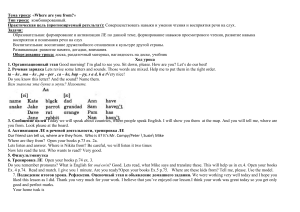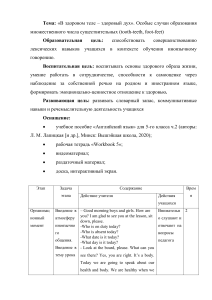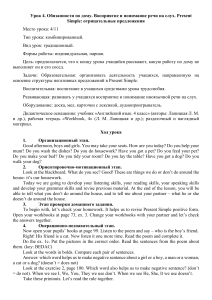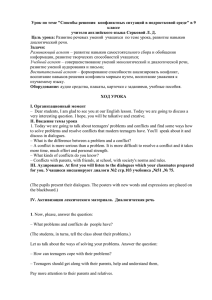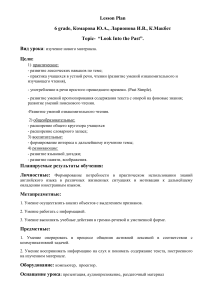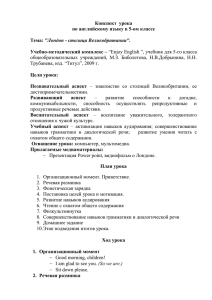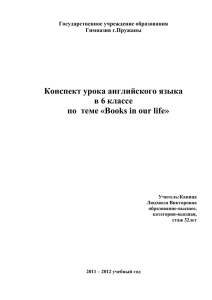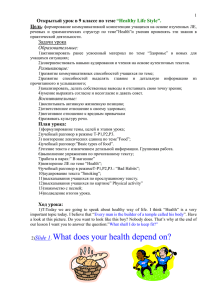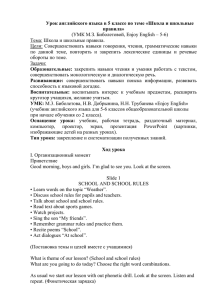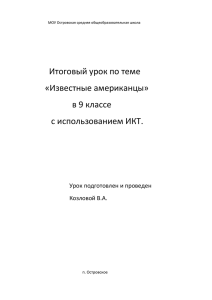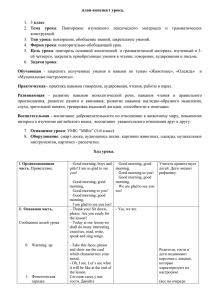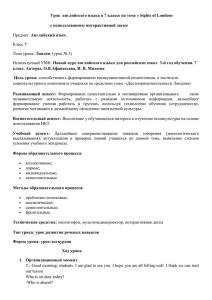План – конспект урока английского языка в 6 классе
реклама
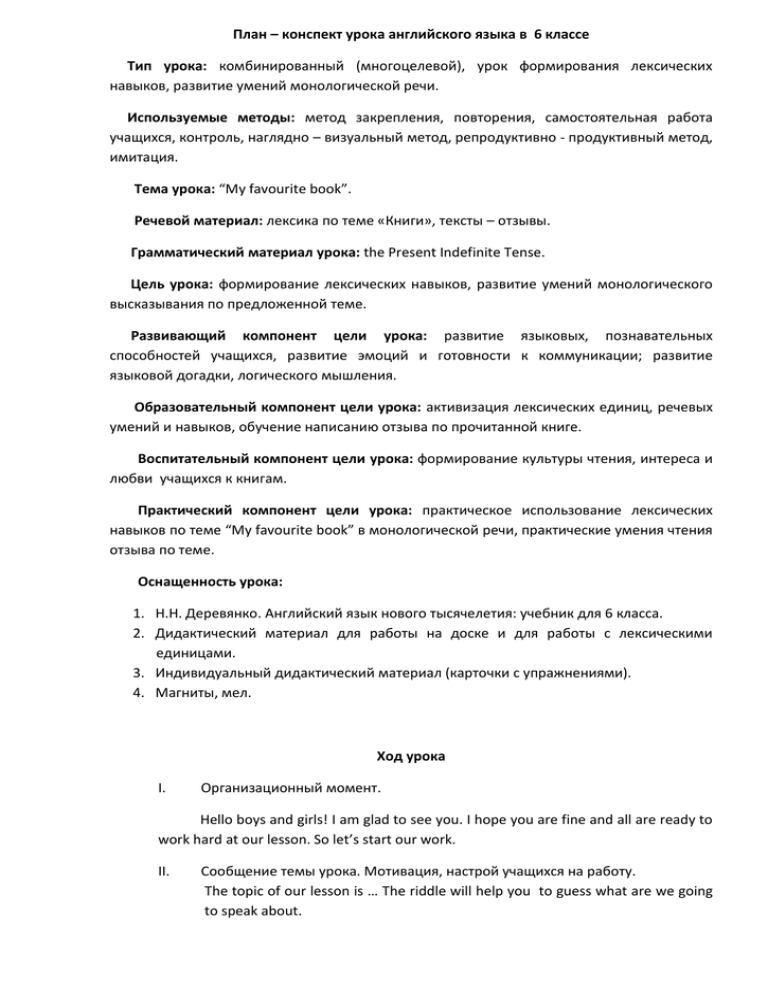
План – конспект урока английского языка в 6 классе Тип урока: комбинированный (многоцелевой), урок формирования лексических навыков, развитие умений монологической речи. Используемые методы: метод закрепления, повторения, самостоятельная работа учащихся, контроль, наглядно – визуальный метод, репродуктивно - продуктивный метод, имитация. Тема урока: “My favourite book”. Речевой материал: лексика по теме «Книги», тексты – отзывы. Грамматический материал урока: the Present Indefinite Tense. Цель урока: формирование лексических навыков, развитие умений монологического высказывания по предложенной теме. Развивающий компонент цели урока: развитие языковых, познавательных способностей учащихся, развитие эмоций и готовности к коммуникации; развитие языковой догадки, логического мышления. Образовательный компонент цели урока: активизация лексических единиц, речевых умений и навыков, обучение написанию отзыва по прочитанной книге. Воспитательный компонент цели урока: формирование культуры чтения, интереса и любви учащихся к книгам. Практический компонент цели урока: практическое использование лексических навыков по теме “My favourite book” в монологической речи, практические умения чтения отзыва по теме. Оснащенность урока: 1. Н.Н. Деревянко. Английский язык нового тысячелетия: учебник для 6 класса. 2. Дидактический материал для работы на доске и для работы с лексическими единицами. 3. Индивидуальный дидактический материал (карточки с упражнениями). 4. Магниты, мел. Ход урока I. Организационный момент. Hello boys and girls! I am glad to see you. I hope you are fine and all are ready to work hard at our lesson. So let’s start our work. II. Сообщение темы урока. Мотивация, настрой учащихся на работу. The topic of our lesson is … The riddle will help you to guess what are we going to speak about. It has no mouth? But speaks. It is not alive? But it can be a good friend. It is not a tree? But it has leaves. What is it? St: It’s book. T: And the topic of our lesson is “Favourite books”. Please don’t forget to use these phrases (I think, I consider, I prefer, In my opinion…) By the way, do you like to read books? How often do you read books? Is reading important? Who is your favourite writer? What do you like best reading or watching TV? Do you think it’s good to be bookworm? T – Ch III. Фонетическая зарядка. It’s wonderful that some of you are fond of reading books. One wise man said: “ Life without books is a tree without leaves.” Translate the words. How can you understand them? St: I think life without books is boring. T: I agree the life without books is poor, unhappy as a tree in autumn. And here we’ve got the tree and it’ also looks poor and unhappy without leaves help me to grow our “book –tree”. The leaves are the different kinds of the books (учащиеся называют жанры книг учитель закрепляет на дереве). Ch: adventure books, historical books, horror stories, legends, myths, books about wildlife, books about space, stories about detectives, fairy – tales, books about spies, about animals, magic things etc. T: Is it beautiful? Do you like it? Then, let’s go on. IV. Развитие навыков аудирования и языковой догадки. T: Books play an important role in our life because they are our teachers. Now listen the beginnings of different kinds of stories and try to guess what story it is. 1. Many, many years ago there lived a princess. She was a beautiful girl with long nice golden hair. The queen and the king loved their daughter very much (fairy –tale). 2. This planet is the most interesting planet. It is the smallest and the coldest of all planets. There are no stars near it (a story about space) 3. It was a dark night. I was alone at home. My mum and dad were away. I sat and read a book. Suddenly the door opened and I saw a light. I was afraid of it. I wanted to get up from the chair but I couldn’t (horror story) 4. There was a crowd near the house. Perhaps something happened, may be a crime. Sherlock Holmes and Doctor Watson tried to solve the mystery (detective story) 5. The Bengal tiger is the national animal of India. It is red or orange with black, grey or brown stripes. It hides in tall grass and hunts big animals like deer. It is a really beautiful animal (about animals). V. Актуализация знаний, полученных на предыдущих уроках. T: You’ve done the task well. There are lots of books, lots of writers. Some of you like reading books, others don’t like. But all of us like to play. Let’s play “A detective”. Let’s work in groups. Your task is to describe the book your group likes, but don’t tell the title of the book. Use the vocabulary list: The book is written by… The title of the book is… The book describes… The main character of the book is… Other characters of the book are … The book is exciting/boring/interesting/magic/horror… The book has … (happy/boring/funny/silly) end T: The best bookworms are in group number … VI. Развитие навыков чтения по теме (отзыв по прочитанной книге). Предтекстовой этап. T: Of course, every person who likes reading has his/her prefers. T - P1, P2, P3: What kinds of books do you prefer to read? Why? And today we are going to learn how to write or to talk about the most interesting books. Open your books on page 20 ex. 1a. You can write a book review. Review - is a description of a book you have read and want to tell others about. Let’s read the reviews. Ch read the reviews. Текстовой этап. T: Whom is this review written by? Would you like to read this book? Why / Why not? The second review is written by Heather,12. Do you like the reviews? Why do we write the reviews? What do these reviews include? Do the reviews tell us what happened at the end? Why? T: Because it will be more interesting for people to read the book if we don’t know what happened at the end. VII. Обучение написанию отзыва по прочитанной книге. Послетекстовой этап. Now we are going to learn how to write the review of your favourite book. There are four steps to writing a Book Review: 1. Write the title and the writer. 2. Write three or four sentences about the story. What is the story about? Who are the main characters? What do the main characters do in the story? Who is your favourite character? Why? 3. Your opinion Do you like the book? Why? 4. Your recommendation Do you recommend this book to another person? VIII. Этап тренировки написания отзыва. Выполнение тренировочных и подстановочных упражнений. Look at the blackboard somebody writes the review in jumbled order, help me write the steps in the correct one. And now try to complete the review for the story The Cat Mummy p. 14 (discuss every sentence before writing). IX. Заключительный этап (подведение итогов; выставление отметок; инструктаж к домашнему заданию; рефлексия). Now let’s remember how many steps are in writing a review? What is the first/second/third/fourth step? OK. I liked the way you worked. But especially I liked the results of … Your marks are… Your hometask is: ex. 4p. 21 WB P. 16 - 17. If you’ve liked our lesson give me a smile. Thanks for your work. Good bye. Use the vocabulary list: The book is written by… The title of the book is… The book describes… The main character of the book is… Other characters of the book are … The book is exciting/boring/interesting/magic/horror… The book has … (happy/boring/funny/silly) end T: You’ve done the task well. There are lots of books, lots of writers. Some of you like reading books, others don’t like. Try to find the best bookworms in your class/group. Let us work in group of 5. Each group gets 3 tasks: the first envelope has blue cards with the names of British writers; the second envelope has the titles of the books; the third envelope has the names of characters. Your task is to match the writers, titles and characters. I’ll give you 3 minutes Card 1. Mark Twain, Robert Louis Stevenson, Sir Arthur Conan Doyle, James Fenimore Cooper, Rudyard Kipling, Mark Twain. Card 2. Treasure Island, The Jungle Book, The Adventures of Huckleberry Finn, The Last of the Mohicans, Tom Sawyer, Sherlock Holmes Stories. Card 3. Doctor Watson, Tom Sawyer, a little boy, Jim Hawkins, Indians, Huck Finn. Мешалкина Светлана Николаевна, учитель английского языка Дата размещения: 19.11.09 Срок действия: 2009-2010 г.
